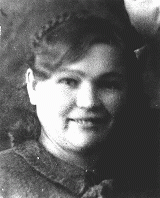
Alexandra Schicharva
Born: January 19, 1923
Magovka, Soviet Union
Alexandra was the second-youngest of six children born to Russian Orthodox parents. Her family lived in a small village in the Orlovskaya region, some 250 miles south of Moscow [in the Soviet Union]. She attended public school, where she learned German. Alexandra's father was a plasterer and painter, and often worked away from home for months. Her mother worked at a collective farm in the village.
1933-39: In 1933 food was scarce. The government seized grain harvests for export; other crops were taken to feed the military. Alexandra's family improvised for food. Nettles picked from a meadow made a good soup; oak leaves, dried, crushed and mixed with a little flour made bread. In 1936 they joined her father in Zhdanov on the Azov Sea where he had moved for work. Her family lived in a one-room apartment, and shared a kitchen with two other families.
1940-44: In May 1942 Alexandra was deported with other Soviets by cattle car to Germany. They were now slaves to the Reich, and had to wear a patch to show that they were "easterners." Alexandra was assigned to work at an inn on the Mosel River. Her Nazi boss, a cold woman, relished telling Alexandra that she was a subhuman. Secretly Alexandra would listen to Soviet news on their radio. One day she was caught and questioned by the Gestapo. She told them she listened only to hear her own language. They warned her that next time she would be sent to a concentration camp.
Alexandra was liberated by American forces in March 1945. She remained in Germany, working in both the Soviet and American zones, before emigrating to the United States in 1949.

